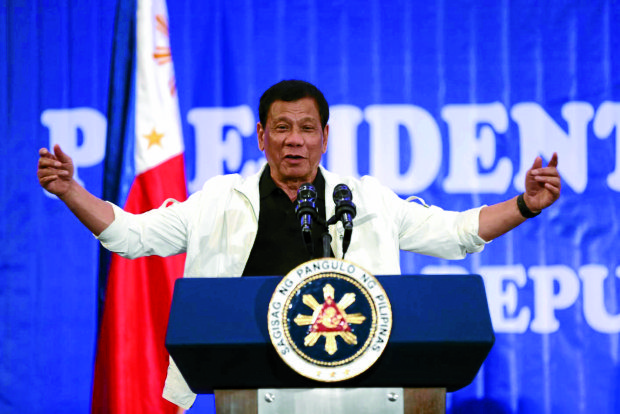Opposition lawmakers on Friday said allowing President Rodrigo Duterte to appoint barangay officials will give him control over the people like the late dictator Ferdinand Marcos, but administration supporters countered that selecting rather than electing village leaders will get rid of those linked to drugs.
“Imagine the possibilities of appointing at least eight officials in each of the 43,000 barangays all over the country,” said Akbayan Rep. Tomasito Villarin, a member of a minority bloc in the House of Representatives.
“That’s 344,000 people at the beck and call of the President!” he said.
He said that during the Marcos dictatorship, barangays became “a machinery to monitor and control the people.” Marcos also used barangay assemblies to ratify the 1973 Constitution, the legal mantle to his dictatorial rule, he said.
Mr. Duterte’s plan would require a new law to again postpone barangay elections scheduled for October and to give him authority to appoint village leaders. Barangay and Sangguniang Kabataan elections scheduled for October 2016 had been moved to October 2017 under Republic Act No. 10923 passed last year.
The poll watchdog, National Movement for Free Elections (Namfrel), warned that not holding elections regularly could undermine the democratic process of ensuring the citizens’ right to choose their leaders and make them accountable.
Namfrel secretary general Eric Alvia said regularity of elections is important to establish the mandate, legitimacy and moral authority of elected leaders.
Speaker Pantaleon Alvarez, Mr. Duterte’s chief ally in the House, agreed that village officials who use their positions for the illegal drug trade should be replaced by presidential appointees.
“We have no problem with that and we support the President in that it is quite a valid reason,” Alvarez said in a radio interview on Friday.
Interior Secretary Ismael Sueno said that under Mr. Duterte’s plan all barangay posts will be declared vacant “and persons not involved in drugs will be appointed in their place.” The new barangay chairs and council members would be appointed through the Department of the Interior and Local Government, he added.
Namfrel’s Alvia, however, questioned the plan to appoint rather than elect village leaders.
“Going by the criteria: what is (the administration’s) mandate, legitimacy and moral authority? They may be prone to abuse their office and appointment authority,” he said.
Alvarez said he does not expect any constitutional problems as the plan would only entail legislating amendments to the Local Government Code.
Senate President Aquilino Pimentel III said there should be a law to provide the legal basis for whatever may be done by the President in lieu of a barangay election. “I would have to discuss that with my fellow senators and I hope the Speaker would discuss it with his fellow congressmen,” Pimentel told reporters.
“The appointive power is by default placed on the President. But this certainly still needs a law because this is a mandate,” he said. “The mandate must be renewed periodically.”
Villarin said the plan reeked of the President’s dictatorial tendencies. “If barangay officials are involved in drugs, let the people kick them out through the ballot. Give that power to the people not to one person. That’s the essence of democracy,” Villarin said.
Albay Rep. Edcel Lagman, an opposition leader in the House, said neither the President nor the interior secretary should be allowed to appoint barangay officers in charge. “The choice of elective officials belongs to the electorate,” Lagman said. —WITH REPORTS FROM JULIE M. AURELIO AND JEANNETTE I. ANDRADE
